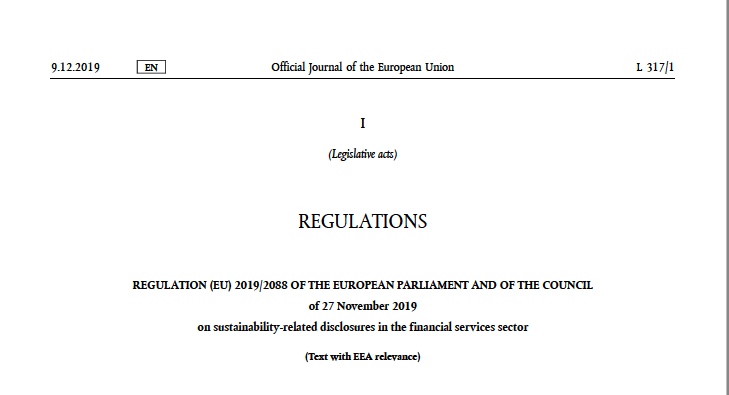
The European Union has embarked on an aggressive legislative push to make environmental, social, and governance (ESG) considerations as a focus of financial services industry regulation. The first salvo in the EU push, the Regulation on Sustainability-Related Disclosures in the Financial Services Sector (SFDR), was finalized in December of 2019, with an implementation deadline for key provisions (Level 1) on March 10, 2021. The new regulation is broadly applicable to almost any type of asset manager, including investment firms, banks, pension funds, and insurance companies. The effect of SFDR is expected (and may even be intended) to be felt beyond the financial sector, shifting market appetites toward ESG-friendly companies, giving such companies a competitive advantage in the ability to raise capital in the corporate finance market.
Disclosure-Driven Regulation
SFDR is essentially a disclosure regime for the EU financial services sector, which requires covered firms to make a series of sustainability-related disclosures to current and potential investors via the firm's website, prospectuses, and periodic reports. These disclosures are complicated because some SFDR requirements will apply to all asset managers, even those that do not have an express ESG-focus or sustainability-focus. Simultaneously, some aspects of the SFDR apply only to those financial products that are specifically ESG-focused.
The disclosures focus on three areas:
- Sustainability risks. Covered financial firms are required to assess on a "best-efforts basis" the effects of sustainability risks on the financial return of the products it offers. Firms also have the option to disclose why sustainability risks are not relevant to a particular product.
- Principle adverse impacts (PAI). Covered firms must also describe their due diligence around risk assessment, stewardship policies, and how they address the potential negative effect or "footprint" of their investments and products.
- ESG positioning. This disclosure is an effort to prevent "greenwashing" (i.e., false or overstated claims that a company's products are more environmentally friendly than they in fact are). By requiring more transparency regarding firms' financial products that have sustainable investments as their objective versus those products that merely promote, among other things, environmental or social aspects, the regulation seeks to help investors differentiate the two.
Competitive Frenzy
With Level 1 compliance looming in March, EU financial firms are undoubtedly working hard to create high-quality sustainability disclosures and integrate ESG factors into their existing and prospective financial products. With the ever-increasing appetite for ESG-friendly investments and the EU's thumb on the scale, the firms that manage to do so effectively will have an outsized advantage over those who don't.